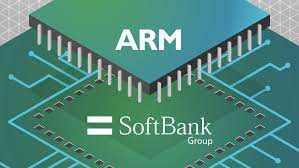The largest initial public offering of shares in over two years will take place on Thursday when Arm Holdings, a British chip manufacturer, begins trading on the Nasdaq.
Arm’s market value is $54.5 billion at the current share price of $51. Given the enthusiasm among investors in the offering, the opening trade might be significantly higher.
Even though most consumers use at least one product with Arm’s chips, many may not be familiar with the brand. Almost all smartphones, the vast majority of tablets, and digital TVs employ its chip design. In more recent years, Arm has expanded into fields like autonomous driving, cloud computing, smart gadgets, and the metaverse.
The IPO market, which has seen very few companies go public over the past two years, has benefitted significantly from Arm’s sale. It’s also a crucial time for Japanese technology investor Softbank, which purchased Arm in 2016, as well as for investment banks like Goldman Sachs, which lately receive much less income from underwriting and consulting fees.
Nearly 90% of the Arm will remain in the hands of Softbank. The electric truck manufacturer Rivian’s IPO in November 2021, when it had a market value of more than $66 billion, was the largest IPO to date.
The core of Arm’s business is not chip production, which it outsources to partners, but rather chip design and intellectual property licensing to clients. The company’s most recent fiscal year, which concluded in March, saw $2.68 billion in revenue and $524 million in profit.
According to IPO tracker Renaissance Capital, about 400 companies went public in 2021 as the stock market rose for the third year in a row. A rise in transactions involving special purpose acquisition firms, or SPACs, contributed to the increase in that number. SPACs, also called “blank-check companies,” exist only to acquire a private company and list it on the stock exchange. SPAC transactions are preferred by some businesses because they have fewer disclosure obligations.
The stock market then went into reverse last year when the Federal Reserve abruptly increased interest rates to combat excessive inflation, with the S&P plummeting by almost 20% and the Nasdaq composite dropping by more than 30%. The number of IPOs dropped to 71 as private companies became reluctant to go public. By early September of this year, 70 companies had gone public, despite the fact that very few businesses are opting to go public through a SPAC deal due to the economy’s unexpected resilience.
From 1998 through 2016, Arm was a public business. With tremendous excitement, SoftBank Group CEO Masayoshi Son announced the $32 billion purchase of Arm in 2016, emphasizing that it demonstrated his confidence in the promise of IoT, or the “Internet of Things” technology.
A plan that Softbank had announced to sell Arm to American chipmaker Nvidia for $40 billion in 2020 was scrapped last year due to regulatory issues. Son had predicted at the time that Arm’s use of cell phones and electric vehicles would cause the company to grow “explosively”. Rene Haas was hired by Son to lead Arm after the acquisition fell through. Haas, a seasoned professional in the semiconductor sector, formerly worked for Nvidia.
One of the most well-known examples of a rags-to-riches triumph in Japan’s corporate world is Son, who created SoftBank. In his wide range of technology ventures, he has experienced both successes and disappointments, while he claims that he has had more long-term successes than failures. He was a University of California, Berkeley graduate who recognized the internet’s potential decades earlier.
Some of Wall Street’s illustrious organizations, notably Goldman Sachs, have seen a reduction in revenue as a result of the downturn in IPOs and mergers and acquisitions. One of the primary underwriters for both the Arm IPO and the anticipated next-week offering from food delivery business Instacart is Goldman.

















